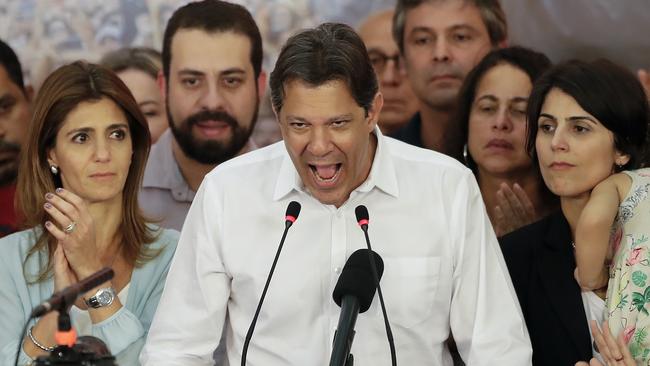
In romping to victory in Brazil’s presidential election, Bolsonaro has revolutionised its modern politics. As recently as three months ago he was given no chance of winning.
A former junior army officer who served 28 years in congress without notable achievement, he is a right-wing populist with a long record of saying things even more offensive and outrageous than were Trump’s pre-election statements.
Bolsonaro, like Trump, had spoken out in favour of torture. Worse, he praised military dictatorships, lamented that Brazil’s dictators did not kill more dissidents, told a congresswoman she was too ugly to deserve to be raped, insulted the descendants of former slaves as lazy and unfit even for breeding, talked of trying to cure people from being gay and said he could not love a gay son.
And yet Bolsonaro, the candidate of a formerly marginal party, won more than 55 per cent of the vote in the second round of the presidential election including, it seems, a majority of women voters.
Brazil is Latin America’s biggest country and the world’s fourth most populous democracy, yet this election is not exactly a question of Left versus Right.
It is much close to insider versus outsider, establishment versus maverick, globalisation versus nationalism, corruption versus a new broom and the total failure of credibility of the old system. Similar dynamics have just elected a left-wing populist, Andres Manuel Lopez Obrador, president of Mexico.
The left-wing Workers Party had ruled Brazil for nearly 15 years and was spectacularly corrupt, even by Latin American standards. Its former president, Inacio Lula da Silva, is in jail today. Operation Car Wash, the big anti-corruption drive of the past four years, has seen more than 230 officeholders and officials convicted.

At the same time, the Workers Party failed at essentials. Services were spluttering, the country endured its worst ever recession, emerging in 2017 to barely 1 per cent of economic growth. There are nearly 65,000 murders a year and Brazil furnishes more than a quarter of the world’s 20 most dangerous cities. About 12 million Brazilians are unemployed.
All of this amply justified turfing the Workers Party out. But there were plenty of more centrist or centre-right candidates to choose from. What set Bolsonaro apart?
One factor was that he was stabbed and seriously injured at a campaign rally. Brazilian politics, like politics almost everywhere, is increasingly polarised. If the other side really, really hates a candidate, that tends to endear them to their own side of politics.
Then, as far as we can tell, Bolsonaro is not corrupt. The Workers Party system was so corrupt it almost resembled the old East European communism — its leaders living lavish lifestyles while the denizens of the workers’ paradise its ideology promised toiled in ever more wretched squalor.
Three other factors, pertinent to right-wing populism in many countries, also suggest themselves. Many of Bolsonaro’s comments were truly offensive. But this very offensiveness, as with Trump, seemed to signal to the electorate that Bolsonaro was a genuine outsider, not part of the political establishment.
It is safe to say that 55 per cent of Brazilians do not hold pro-dictatorship, pro-torture, anti-gay or quasi-racist views. But millions of Brazilians were so disgusted with the Workers Party that they chose the greatest possible break with its orthodoxies. Peculiarly, the specific pleasures of verbal transgression — long enjoyed by the Left from the days of “Go f..k yourself with your atom bomb” — have migrated to the Right.
Despite his vulgarity, Bolsonaro also positioned himself as a champion of Christian values in a nation where evangelical and Pentecostal churches are on fire.
And finally, and perhaps most importantly, don’t forget that Bolsonaro offers a plan of radical, liberal economic reform. He is going to privatise government bodies and cut taxes, again something like Trump. And, as with Trump, the market loves all this. The Brazilian stockmarket and currency soared on news of his ascendancy in the first round of presidential voting.
Latin America has a long record of populists who disappoint. Whether Bolsonaro can deliver on the economy, law and order and the culture wars will be fascinating to watch.
He has Trump’s example to show him the path to success does not lie in reversion to the centrist mean, though hopefully the extreme statements will fade into the background.




Jair Bolsonaro has smashed the Brazilian political establishment as surely as Donald Trump smashed its US counterpart.